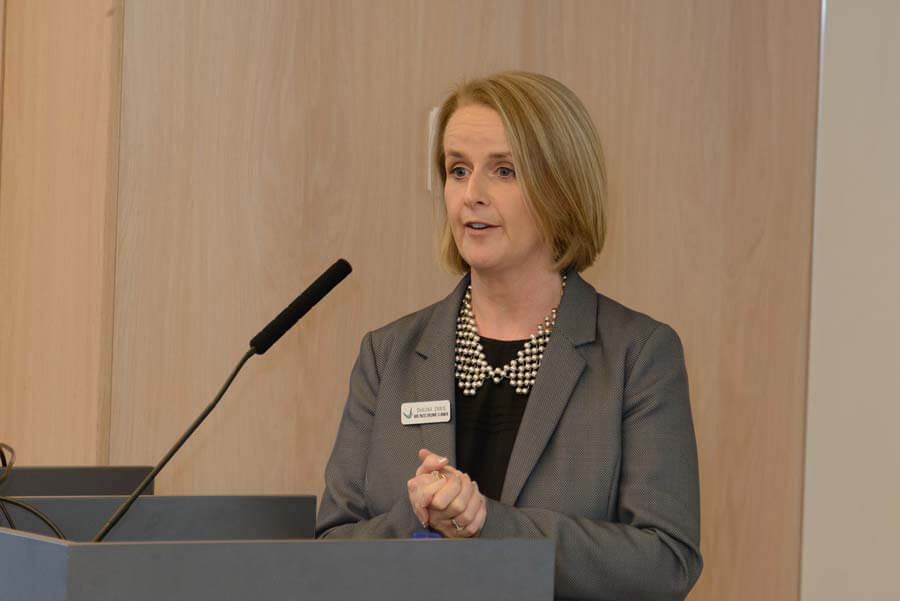The implementation of an innovative nursing role of Clinical Support Nurse Manager at night in Tallaght Hospital, Dublin, to maximise safety and minimise risk during out-of-hours was presented to the judges by Shauna Ennis, Nursing Practice Development Co-ordinator (Adult Service) at Tallaght.

She made the presentation on behalf of the hospital’s Out of Hours Clinical Decision-Making Steering Group.
She said the out of hours period was associated with less favourable patient outcomes in the acute care setting. To maximise safety and minimise risk it was necessary to have the appropriate staffing and skill mix, personnel and equipment resources, communication structures and access to services.
The Clinical Decision Making Out of Hours Steering Group was established in 2014 with a membership of senior medical and nursing personnel and key stakeholders.
Its objective was to develop, implement and evaluate a model to support the delivery of high quality care outside of normal working hours.
First, they felt they needed to establish a baseline understanding of the organisational supports and barriers to workflows. A collaborative research study was undertaken with colleagues in the Trinity Centre for Practice and Healthcare Innovation and from November 2015 to April 2016 data was collected from semi structured interviews, focus groups, interviews and an in-depth analysis of patient flow in a medical and surgical ward.
Its objective was to develop, implement and evaluate a model to support the delivery of high quality care outside of normal working hours.
They found barriers to effective workflow with regard to communications systems, organisational factors, skill mix and increased demands for services.
In communications there were challenges with regard to the bleep system, protected time for clinical handover, handover processes and the lack of computerised patient records.
On the organisational side, 46 different consultants admitted patients to one surgical ward in three months leading to safari ward rounds and there was lack of access to critical care beds, diagnostics and medication.
In skill mix, there were issues with nursing vacancies, high staff turnover and few nursing staff during the out-of-hours period with phlebotomy and IV cannulation skills.
Junior doctors were well supported by senior colleagues and nursing staff could escalate if they had concerns regarding a patient. To further facilitate effective workflow a need was identified for a new innovative nursing post: Clinical Support Nurse Manager at Night.
The role of the Clinical Support Nurse Manager at Night would be to:
- Be an Emergency Response Team Responder.
- Follow-up patients discharged from higher levels of care.
- Review patients following ERT calls.
- Facilitate safe transfers to diagnostics and higher levels of care.
- Support alternative care pathways i.e. end of life.
- Support staff caring for deteriorating patients at ward level and while awaiting higher level of care bed.
- Support staff to initiate respiratory therapies (non-invasive ventilation/Airvo (device which delivers a high concentration of oxygen).
- Tracheostomy support, education and management
- Formal and informal education.
Their vision was delivery of high quality patient care seven nights a week, immediate access to critical care nursing expertise on ward areas, early provision of critical care interventions for deteriorated patients, a stabilised in-patient cardiac arrest rate and mortality rate, reduced demand for higher level of care beds and reduced re-admission rates to the intensive care unit.
Of 485 patients reviewed in that period, almost 80 per cent had been discharged home.
Ms Ennis said the possible risks were that it was the first role of its kind in Ireland, lack of role clarity with NCHDs, lack of consensus with consultant colleagues, resistance from medical and nursing personnel and deskilling of nursing staff.
To overcome these risks, they consulted with colleagues in the UK but ensured the role fitted the job description based on local evidence, carried out an on-going evaluation of the role, engaged in consultation and communication, had an on going engagement with consultants and ensured key stakeholders were included on the Steering Group, communicated the new role to medical and nursing personnel, built relationships and clinical credibility and engaged in formal and informal education.
They introduced the ISBAR3 Handover Tool for handover between various services and disciplines to overcome the barrier of interrelation of the new role with existing critical care outreach service provided “in hours” and had ongoing communications with NCHD colleagues.
Turning to the benefit of the new system, Ms. Ennis said that between January and October 2017 the Clinical Support Manager at night had undertaken 1,378 reviews of patients who had deteriorated or were at higher risk and had responded to 162 Emergency Response Team calls.
The majority of the patients reviewed by the CSNM@night were older patients aged between 71 and 80, followed by those aged between 61 and 70 and then those aged between 81 and 90.
Recent discharge from HLOC was responsible for the majority of calls to the CSNM@Night. Next was follow up following an ERT call, Airvo review, direct referrals from nurses, follow-up reviews following direct referrals, ERT calls, Tracheotomy Reviews and requests for assistance to set up Airvo.
The main interventions carried out were giving advice on patient care, fluid balance management, oxygenation, Airvo management, blood test review, tracheotomy care and management of Non-Invasive Ventilation.
Ms. Ennis said of 485 patients reviewed in that period, almost 80 per cent had been discharged home. The numbers of cardiac arrests in in-patient ward areas dropped significantly and unscheduled demand for higher level of care beds had declined.
She said their plans for the future were to continue to develop and evaluate the role ensuring it met the needs of patients, a Phase 2 Study to provide an evaluation of the CSNM@Night role by key stakeholders, to expand the role/skill of the CSNM@Night e.g. arterial blood gas sampling, nurse prescribing and nurse referral for X-Rays and to develop and implement the relevant policies and procedures to support this service.
The Steering Group acknowledged the financial support of the Meath Foundation in Tallaght Hospital and the Nursing and Midwifery Planning and Development Unit.

